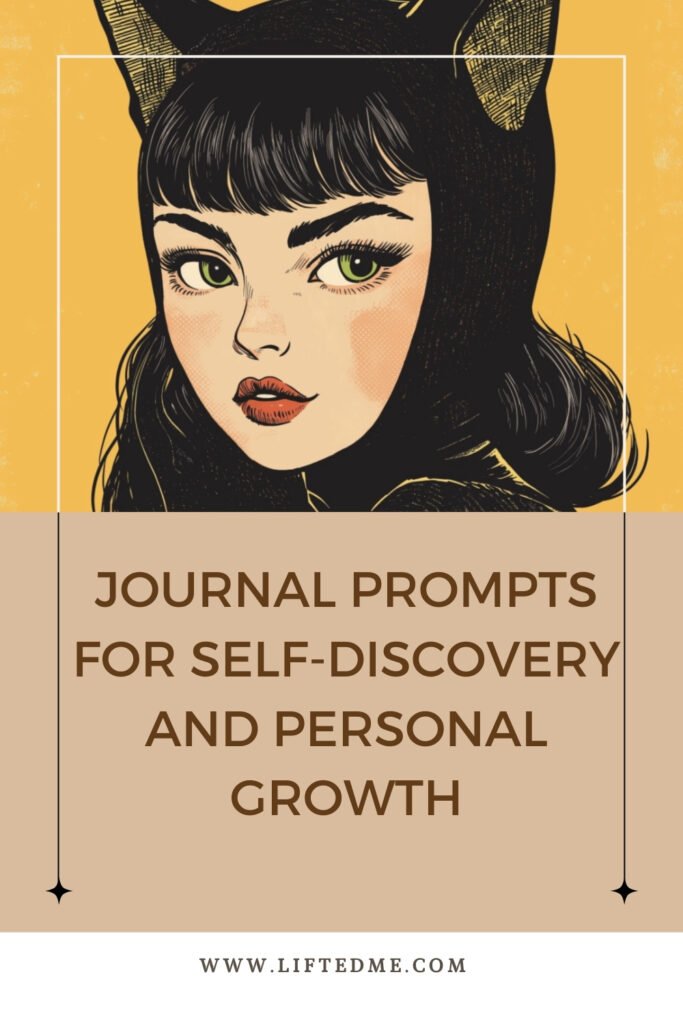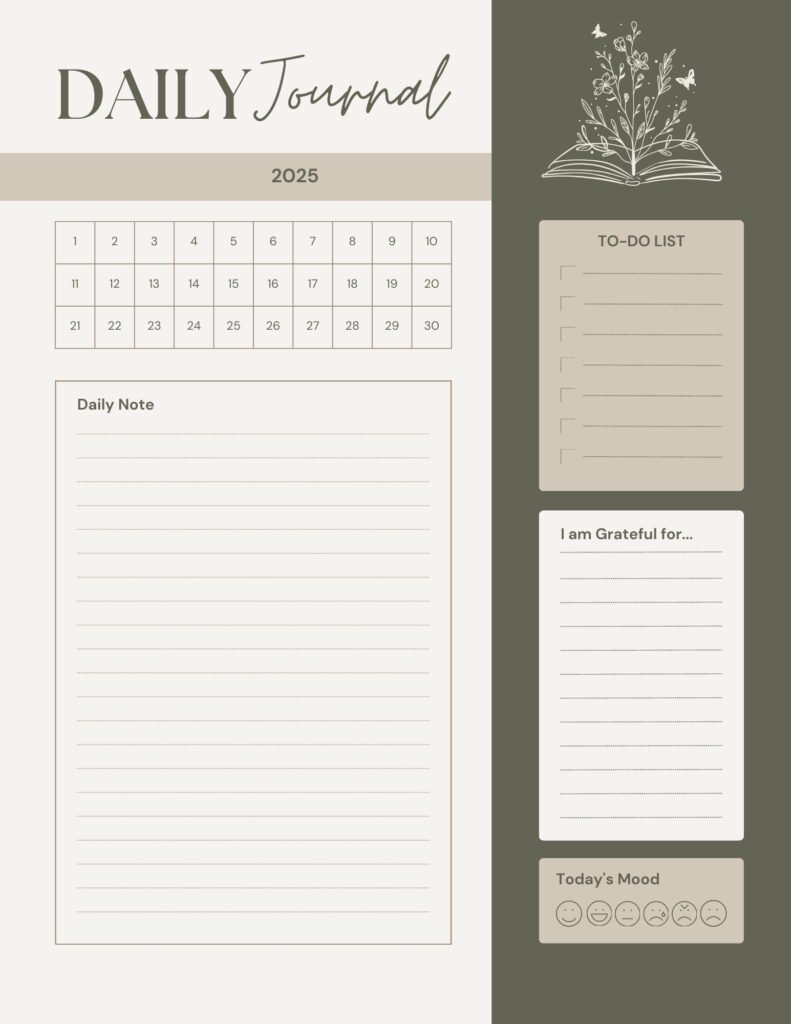Journal Prompts for Self-Discovery and Personal Growth
This post contains paid and/or affiliate links. I make a small commission at no extra cost to you. Please see our Privacy Policy.
Journaling has been a key way for self-reflection and growth for many famous thinkers and artists. People like Leonardo da Vinci, Frida Kahlo, Mark Twain, and Marcus Aurelius used it to understand themselves and the world. Now, social media platforms like TikTok and Instagram have made journaling more popular for personal growth and self-discovery.
Journaling is a strong tool for personal growth. It helps people change negative thoughts, clear up their values and goals, lower stress, and boost creativity. A journal can be a great resource for personal change and growth, whether for keeping records, exploring oneself, or for therapy.
The Power of Journaling for Personal Growth
Many great thinkers and artists have used journaling throughout history. People like Leonardo da Vinci, Frida Kahlo, and Mark Twain found it helpful. They wrote down their thoughts and feelings to reflect and grow.
Journaling is a powerful tool for personal growth. It helps you change negative thoughts, understand your values and goals, and reduce stress. It also boosts your creativity. Writing down your thoughts lets you see yourself and your life patterns better.
Journaling for Self-Reflection and Introspection
Journaling for personal growth can change you. It makes you think deeply about yourself. By writing regularly, you can find out what you really want, see what stops you, and make your actions match your values.
Journaling is a safe place to look at your thoughts and feelings. This leads to better self-knowledge and growth.
“Journaling is a way to start getting to know yourself, to start understanding your own thoughts, feelings, and behaviors.” – Dr. James Pennebaker, psychologist and expert on the benefits of expressive writing.
It doesn’t matter if you use a traditional or digital journal. Therapeutic writing practices can profoundly affect your creativity and mindfulness. Writing down your thoughts helps you understand yourself and the world better. This can help you reach your full personal growth potential.

Getting Started with a Personal Growth Journal
Starting a personal growth journal can be very rewarding. You can choose between writing with a pen or using a digital app.
Pick what feels right for you. Then, find a quiet spot where you can focus and think without distractions.
Don’t worry if you don’t write for hours at first. Journaling Practices and Techniques suggest starting with short sessions. Even a few minutes a day is good. Use Guided Journaling Prompts to help spark your ideas and overcome the fear of a blank page.
Let your thoughts flow freely, without worrying about grammar, spelling, or punctuation. Overcoming Journaling Barriers is about being kind to yourself and creating a judgment-free space.
As you Start a Personal Growth Journal, remember it’s about discovering yourself, not being perfect.
Choose the Journaling Mediums and Formats that suit you best. Let your journal be a safe place to explore your thoughts, feelings, and personal growth.
“Journaling is not about writing for others, it’s about writing for yourself. Let your thoughts flow freely and without self-censorship.”
Jumpstart Your Journaling Practice
- Choose a journaling medium that feels comfortable and sustainable for you.
- Find a quiet, distraction-free space to write in.
- Start with short sessions, even just a few minutes a day.
- Use guided prompts to help spark your ideas and overcome the blank page.
- Focus on self-discovery, not perfection, and let your journal be a judgment-free zone.

Inspiring Journal Prompts for Self-Discovery and Personal Growth
Journaling is a powerful way to discover yourself and grow personally. By writing down our thoughts and feelings, we learn a lot about ourselves and the world.
We’ve put together 50+ inspiring prompts to help you on your journaling path. These cover many topics, like finding out who you are and setting life goals.
These journal prompts for self-discovery and personal growth journaling help you think deeply about yourself. They’re great for uncovering your values, changing negative thoughts, or boosting your creativity. These therapeutic writing prompts are a great start for your reflective writing exercises.
- What does “a fulfilling life” mean to you?
- What is the best advice you would give to your younger self?
- What are your biggest fears, and how can you overcome them?
- Write a letter to yourself expressing unconditional self-love and acceptance.
- Reflect on a major life lesson you’ve learned and how it has shaped you.
- Describe your ideal daily routine and how it aligns with your values and goals.
- What are your core beliefs, and how do they guide your decision-making?
There’s no right or wrong way to use these introspective prompts. Pick the ones that speak to you, and let your thoughts and feelings flow. By doing this personal growth journaling, you’ll gain valuable insights and move closer to self-discovery and change.
Exploring Personal Identity through Journaling
Journaling is a great way to discover who you are. It helps you understand what makes you special. By writing about your thoughts and feelings, you can learn a lot about yourself.
According to a report by the New York Times, journaling leads to improved sleep, better self-acceptance, and a more robust immune system. Journal prompts make students focus and spark their interest, as UConn’s Center for Excellence in Teaching and Learning found.
There are 90 journal prompts for exploring your identity. These cover things like your values, strengths, and how you handle tough times.
- Prompts for showing gratitude, assessing relationships, and planning for a positive future
- Tailored prompts for beginners, individuals facing emotional challenges, and those at a career crossroads
- Journaling about positive experiences three times a week can boost emotional resilience and relieve stress

Discovering yourself is key to loving yourself more. It helps you accept yourself and understand your values better.
Journaling lets you dive into your feelings, memories, and beliefs. This helps you see who you are and what you want for the future.
Apps like Day One offer many prompts for self-discovery. They help you keep up with journaling by sending reminders and connecting you with others.
“Journaling can decrease symptoms of depression, counteract negative thought patterns, relieve anxiety, boost emotional intelligence, reduce trauma symptoms, and help achieve goals.”
Reflective prompts in journals help you explore and understand life’s big questions. This leads to better self-awareness, creativity, and memory. It also improves your physical health and problem-solving skills. Journaling is a powerful way to discover yourself through writing.
Navigating Life Goals and Aspirations
Journaling is a great way to think deeply about your life and goals. It helps you see what’s important to you and what drives you. By writing about your goals, you can figure out what you really want and how to get there.
Exploring Goals and Obstacles
Use journal prompts to think about the challenges you might face in reaching your goals. Think about what stops you and how you can get past them. Remember, knowing what motivates you and how your goals match your values can help you move forward.
- What are your short-term and long-term goals?
- What obstacles or challenges do you anticipate in achieving these goals?
- How can you overcome these obstacles?
- What are your primary motivations for pursuing these goals?
- How do these goals align with your personal values and identity?
Writing in a journal helps you understand yourself better. It shows you the way to your goals and a more fulfilling life.
“Journaling has been recognized as a valuable tool for self-reflection and personal development, helping individuals navigate their life goals and aspirations.”

Journaling for Love and Relationships
Relationships are key to our happiness and growth. Journaling for Relationships helps us understand ourselves and others better. It makes our connections deeper and more meaningful.
Reflective Writing on Interpersonal Dynamics shows us what we want in our relationships. It helps us see the challenges and how they affect us. Writing down our thoughts makes it clear what makes relationships work.
- Explore your relationship values and aspirations through prompts that encourage you to reflect on the characteristics you desire in a partner or close friend.
- Delve into the obstacles and conflicts you’ve encountered in your relationships, examining patterns and strategies for effective communication and conflict resolution.
- Investigate how your relationships influence your personal growth and self-perception, uncovering the interdependence between your interpersonal experiences and your sense of identity.
Exploring Love and Connections through Journaling builds empathy and trust. Sharing your journal with others deepens your bond. It gives you insights into each other’s thoughts and feelings.
“Strong, supportive relationships have been shown to improve mental well-being and overall life satisfaction. Journaling can be a powerful tool for Journaling Prompts for Relationship Growth, helping you navigate the complexities of your interpersonal dynamics with greater clarity and compassion.”
Cultivating Self-Awareness and Self-Reflection
Journaling is a powerful tool for Journaling for Self-Awareness. It helps us understand ourselves better and grow personally.
By using prompts that look into our feelings, we learn how we handle emotions and build self-confidence. We also learn to take care of ourselves and face our flaws.
Prompts for Reflective Writing on Emotional Intelligence
Writing about our feelings in a journal boosts our emotional smarts. Here are some prompts to try:
- Describe a time when you felt a strong emotion, and how you navigated it.
- What are your go-to coping strategies when you’re feeling overwhelmed or stressed?
- How do you express gratitude, and what impact does it have on your well-being?
Exploring Inner Dialogue through Journaling
Journaling lets us peek into our inner thoughts and how we see ourselves. Try these prompts to explore your inner voice:
- What are your core values, and how do they guide your choices and actions?
- When do you feel most confident, and what makes you feel that way?
- What negative traits or beliefs do you have, and how can you be kind to yourself about them?

Journaling Prompts for Self-Care and Personal Growth
Regular self-care is key to feeling good overall. Journaling with prompts about self-care and growth can really help. Here are some ideas:
- How do you currently take care of yourself every day, and what could you do more of?
- What are your main goals for personal growth, and what steps will you take to achieve them?
- Think about a big challenge you’ve faced. What did you learn about yourself from it?
Using these prompts, we can start a journey of Journaling for Self-Awareness, Reflective Writing on Emotional Intelligence, Exploring Inner Dialogue through Journaling, and Journaling Prompts for Self-Care and Personal Growth. This journey leads to a deeper understanding of ourselves, emotional strength, and a happier life.
Exploring Work and Career through Journaling
Your work and career deeply affect your sense of purpose and fulfillment. Journaling is a powerful tool to explore these life aspects. It helps you gain clarity on your career goals, tackle workplace challenges, and match your professional path with your personal values.
Journaling for Career Exploration
Journaling can change how you see your Journaling for Career Exploration. By writing down your thoughts, feelings, and experiences, you discover your true passions, skills, and dreams.
Use prompts to think about your ideal job, the industries you’re interested in, and the work environment that fits your values.
Navigating Work-Life Balance
Reflective Writing on Work-Life Balance helps you find peace between work and personal life. Use prompts to look at your current work-life balance, see what needs improvement, and make plans for self-care and well-being.
Overcoming Workplace Challenges
Journaling is a strong tool for Overcoming Workplace Challenges through Journaling. Reflect on conflicts with coworkers, tough talks with your boss, or big organizational problems. Writing about these challenges helps you become more resilient and proactive in solving problems.
Aligning Career and Personal Values
Journaling helps you Aligning Career Goals with Personal Values. Think about your core values, long-term dreams, and how your career fits into your fulfillment. This journey of self-discovery lets you make choices that bring together your professional and personal lives.

Journal Prompts for Self-Discovery and Personal Growth
Journaling can change how we see ourselves and grow. It lets us dive deep into our values, goals, and dreams. It also helps us understand our relationships, work, and well-being better.
Here are some journal prompts to start your self-discovery journey:
- Think about the person you want to be and how your daily life can match that dream.
- Find out what brings you peace and stress, and find ways to have more peace.
- Notice your fears and find your inner strength to beat them.
- Picture yourself a year from now, having reached your goals. What does that future look like?
- Take three steps towards the life you want, and think about the feelings and challenges you might face.
- Find five things you love about yourself and how they help you grow.
- Think about what you admire in others and how you can use those qualities in your life.
- Learn about the law of attraction and how being the person you want to be can attract what you desire.
- Make affirmations that truly speak to you and support your growth.
Using these Comprehensive Journal Prompts can lead to a Holistic Approach to Journaling. This approach includes Transformative Journaling Practices and Reflective Writing for Personal Development.
“Journaling is not just about recording your thoughts and experiences; it’s a powerful tool for self-discovery, personal growth, and transformation.”
Benefits of Journaling for Mental Health
Journaling offers many benefits for mental health and well-being. Studies show that regular journaling can reduce stress and anxiety.
It also improves mood, boosts self-awareness, and enhances mental health and resilience.
This simple tool helps people process emotions and gain clarity. It improves overall well-being.
Explore the Therapeutic Impacts of Journaling
Journaling is a powerful therapeutic practice for mental health. By writing down thoughts and feelings, people can understand themselves better. They can spot patterns and find healthier ways to cope.
Journaling encourages emotional expression, self-reflection, and personal growth. This leads to better mental well-being.
“Keeping a journal has been a powerful tool for me to gain clarity, process emotions, and work through challenges. It’s amazing how much insight and healing can come from the simple act of putting pen to paper.” – Jane Doe, Therapist
Journaling is also great for managing stress and anxiety. Writing helps people understand and control their stress. This leads to better mental health and resilience.
- Identify and challenge limiting beliefs
- Clarify career ambitions
- Improve mental health
- Enhance personal growth
Journaling is a powerful tool for reducing stress, gaining self-awareness, or exploring your inner world. It supports mental health and personal growth.

Conclusion
Journaling is a powerful way to discover yourself and grow personally. Many famous thinkers and artists have used it for years. It helps you understand yourself better by recording your thoughts and feelings.
This article offers a wide range of journal prompts. You can explore topics like lifelong learning, life goals, and self-awareness.
Regular journaling is great for your mental health and well-being.
Think about the journal prompts we shared. Start using journaling to discover yourself and grow. By journaling regularly, you can gain new insights and overcome obstacles. It’s a journey of self-discovery and fulfillment.
FAQ
What is the history of journaling for self-discovery and personal growth?
Journaling has been a key tool for self-reflection and growth. Many famous thinkers and artists have used it. By writing down their thoughts, they gained deep insights into themselves and the world.
How can journaling be a powerful tool for personal growth?
Journaling is great for personal growth. It helps change negative thoughts, clear up values and goals, lower stress, and boost creativity.
How do I get started with a personal growth journal?
Start by picking a comfy way to journal, like writing or typing. Find a quiet spot and begin with short sessions. Use prompts to spark ideas and let your thoughts flow freely.
What are some inspiring journal prompts for self-discovery and personal growth?
There are 100 journal prompts in the article for self-discovery and growth. They cover topics like personal identity, life goals, self-awareness, love, relationships, work, and career.
How can journaling help with exploring personal identity?
Journaling is great for exploring who you are. The article offers prompts to help you think about your traits, values, strengths, weaknesses, and life experiences. These shape your identity.
How can journaling help with navigating life goals and aspirations?
The article has prompts for exploring goals, both short-term and long-term. It helps you identify obstacles and see how your goals match your values and identity.
How can journaling be used for love and relationships?
Journal prompts in the article help you think about your relationships. You can reflect on what you want in a partner or friend, the challenges you face, and how your relationships shape your self-image.
How can journaling help with cultivating self-awareness and self-reflection?
The article offers prompts for exploring your inner world. You can think about your emotions, self-confidence, self-care, and negative traits.
How can journaling help with exploring work and career?
The article has prompts for reflecting on your career goals and work challenges. It also helps you balance work and personal life.
What are the benefits of journaling for mental health?
Studies show journaling can reduce stress and anxiety, improve mood, increase self-awareness, and boost mental health and resilience.



